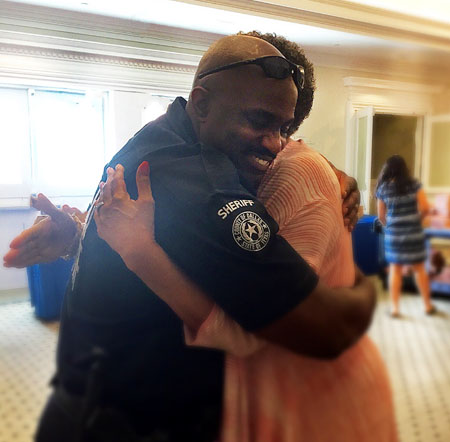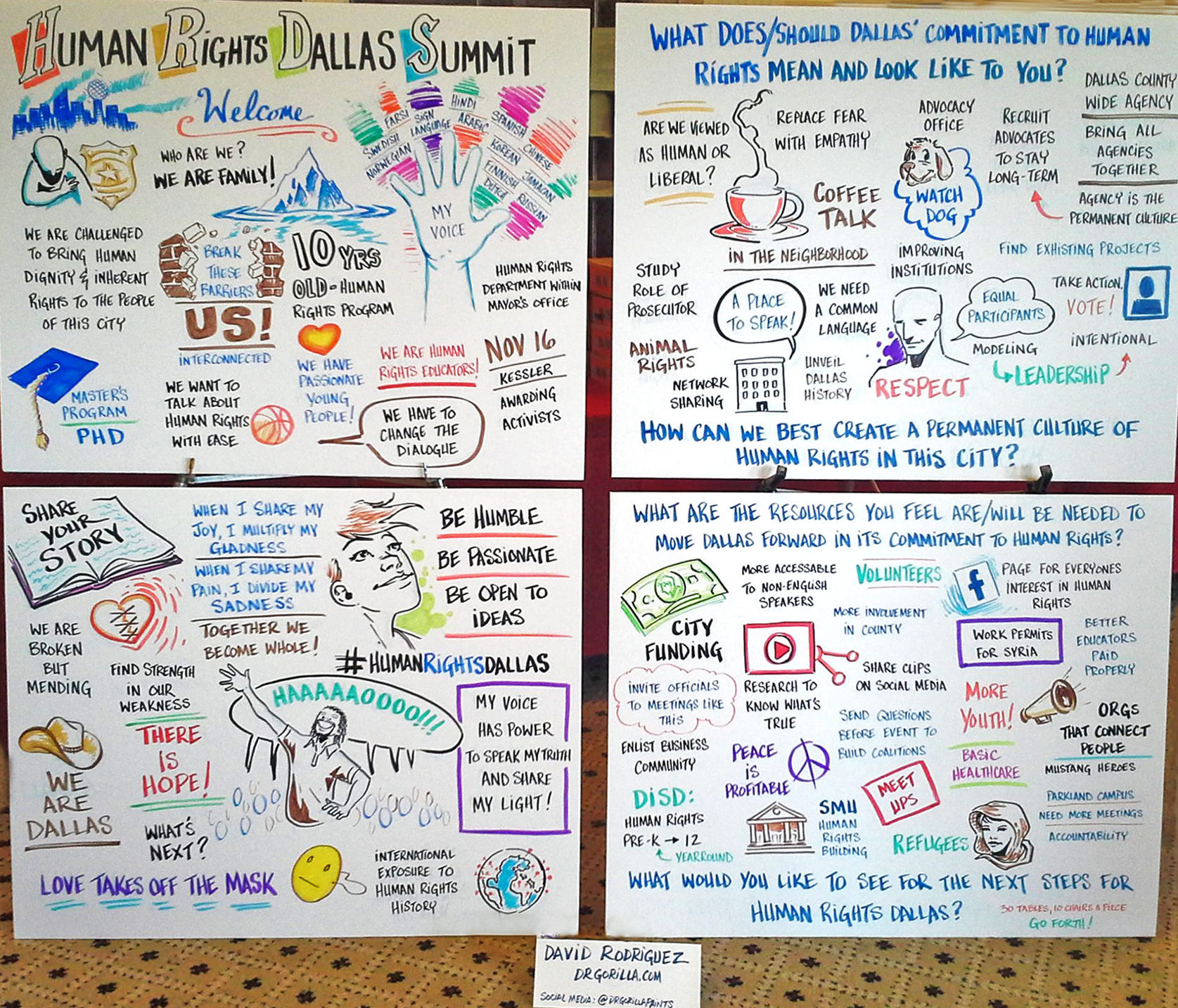Community leaders examine human rights in Dallas
DFW community leaders discuss what they called “dubious distinctions” about human rights in Texas.

By Norma Adams-Wade
The Dallas Morning News
Dallas and Fort Worth community leaders discussed what they called “dubious distinctions” about Texas human rights issues Saturday and proposed plans to improve human rights in Dallas and the state.
|
After tragic week, community leaders take ‘Unified Steps Forward’ at ‘Human Rights Dallas’ summit By Denise Gee DALLAS (SMU) – It had been planned months in advance, but when hundreds of city and county leaders gathered at SMU July 9 for the first “Human Rights Dallas” summit, the city was openly grieving the July 7 murders of five police officers in downtown Dallas after what had been a peaceful protest march. That march was in response to controversial police shootings of two African American men in Louisiana and Minnesota – incidents that had produced anger, anxiety and grief. In taking “unified steps forward,” Embrey Human Rights Program (EHRP) Director Rick Halperin emphasized his event’s goal would not be “to focus on your work, or my work, but our work – to ensure everyone is afforded human dignity, protection and advocacy of their inherent rights.” What resonated most for “Human Rights Dallas” participant Toya Walker, a senior-level paralegal for SMU and the Sabre Corporation, “was getting to openly share thoughts on what a human rights culture could look like, and how we, as a diverse group, could make it a reality.” During larger group discussions and smaller breakout sessions guided by innovative coaching from Journeyman Ink, attendees tackled issues and solutions related to concerns ranging from human trafficking crimes to racial, sexual and religious discrimination. Leaders from business, law enforcement, education, faith, non-profit and other groups expressed overwhelming support “for an official referendum to establish human rights as a top-level concern for Dallas government leaders,” said EHRP Assistant Director Brad Klein. “We also would like to see a public forum for citizens to regularly address their concerns with people who actually can do something about them.” Summit participants vowed to continue the dialogue by staying connected via social media outlets and creating educational opportunities that could start with initiatives as small as a neighborhood gatherings for coffee and conversation. The ultimate question, met with resounding applause, was posed by Tri-Cities NAACP Director Carmelita Pope-Freeman, who summarized the feelings of those at her table: “How can we replace fear with empathy?” While the timing of the long-planned “Human Rights Dallas” event came on the heels of tragic circumstances, Walker said, “I believe it awakened the soul of Dallas and America to know human rights matter.” Leaving the event motivated and inspired, she added, “I believe we have an opportunity to truly enable the change the world so desperately needs.” Progress on “Human Rights Dallas” efforts will be shared via future EHRP communications and also at its “Triumph of the Spirit” Awards event Nov. 16 at the Kessler Theater in Dallas. The celebration will commemorate the 10th anniversary of the program at SMU — only the seventh university in the nation to offer an undergraduate degree in human rights and also a master’s level degree in human rights and social justice. For more details about the Embrey Human Rights Program within SMU’s Dedman College of Humanities and Sciences, contact humanrights@smu.edu, call 214-768-8347 or click here. # # # |
The discussion came during what organizers described as the first local modern-day summit designed to resolve those “most pressing” issues. More than 250 leaders participated in the summit at Southern Methodist University’s Umphrey Lee Center.
Rick Halperin directs SMU’s Embrey Human Rights Program, which hosted the summit. SMU is one of only seven universities in the nation — and the lone one in the South — that offer a human rights undergraduate program. He said the summit was designed to consider all participants’ views of how to create an equal society.
“The goal is to make sure that everyone in this city is afforded human dignity, respect, defense, protection and advocacy of their inherent rights,” Halperin told participants.
Problems discussed ranged from hate groups to human trafficking. High-profile police/community conflicts and fatal shootings in Dallas and across the nation were prominent talking points and inspired vigorous discussions, participants said.
The various incidents as reported by the media “awakened the soul of Dallas and America that human rights matter,” said Toya Walker, a technology company paralegal and external affairs adviser. She also said discussions about human trafficking shed light on an alarming but little-known problem in the state.
Participants addressed what organizers called these five “dubious distinctions” in Texas:
Texas leads the nation in the number of hate groups espousing sentiments that oppose either foreigners, people of other races, or people who are lesbian, gay, bisexual or transgender. But at the same time, Texas has the nation’s largest number of resettled refugees and people seeking asylum from countries such as Iraq, Somalia, Myanmar and Congo.
Texas ranks second in the nation for human trafficking crime, which is increasing.
Texas leads the nation in exonerating people who were wrongfully convicted, while also leading the nation in state-sanctioned executions.
Texas ranks high in the number of child deaths from abuse and neglect, and leads all other states in children who die from being left in hot cars.
Texas has the nation’s highest number of residents without health care coverage.
Participants proposed using the SMU program as home base for planning future sessions and social media communication, working in neighborhoods to educate people about these issues, and having elected officials sponsor referendums to foster dialogue among diverse people.
“Dallas can be the change that the world so desperately needs,” Walker wrote in summarizing her experience at the summit.
Summit organizers will discuss the progress of Human Rights Dallas at the program’s Triumph of the Spirit awards ceremony at 7 p.m. Nov. 16 at Kessler Theater in Dallas. To learn more, visit www.smu.edu/humanrights, email humanrights@smu.edu, or call 214-768-8347.

